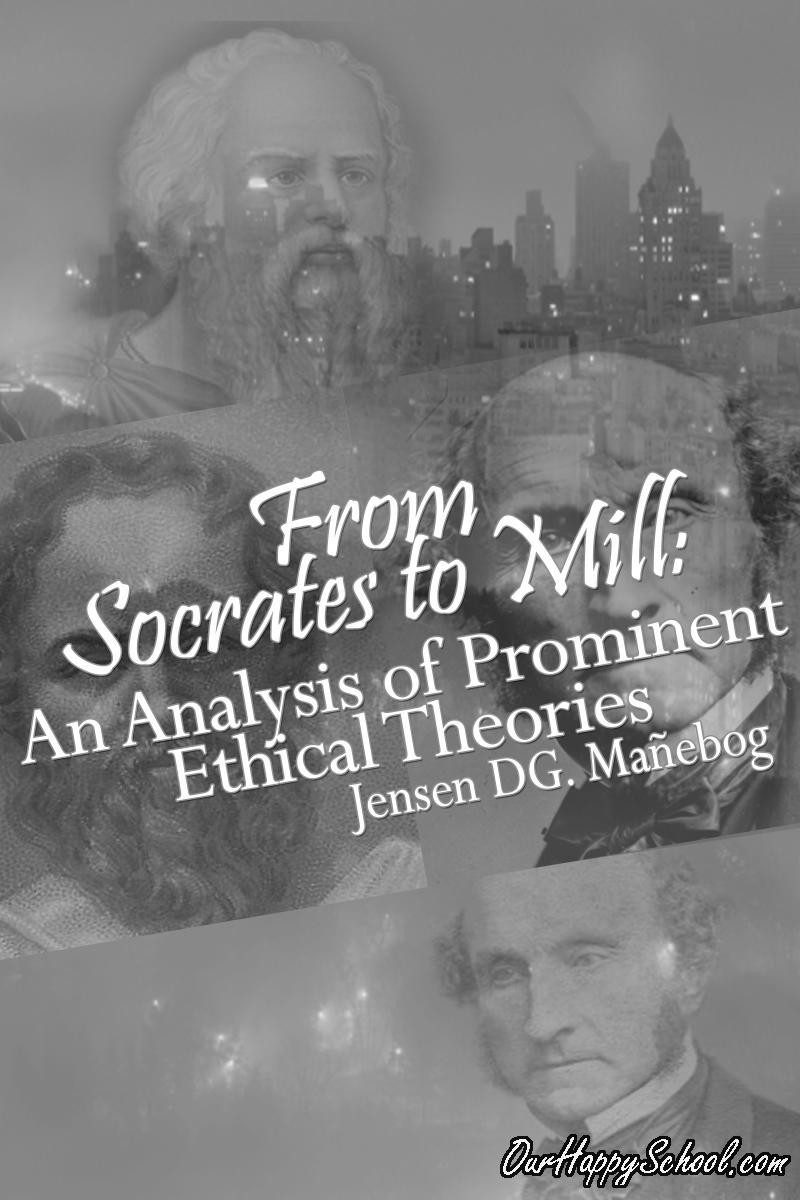Sponsored Links
A Short History of Logic

A Short History of Logic
© 2010 by Jensen DG. Mañebog
Notable pre-Aristotelian philosophers who prepared the way for the formal study of Logic include Zeno of Elea, the Sophists, Socrates, and Plato.
Ancient Period (650 B. C.-400 A.D.)
Considered by some as the founder of dialectic, Zeno of Elea (490-430 B. C.) provided early examples of arguments and paradoxes. Socrates (470-399 B. C.) gave emphasis on definition, deduction, and the use of dialectic to obtain non-relative truths. Plato, his student, was also concern about truth in such a way that the correspondence theory of truth—that which attempts to make the connection between the world and our descriptions of it—can be attributed to him.
Believing that truth is relative, the Sophists were paid teachers who taught skills in language and communication. Among them were Protagoras (490-421 B. C.) who distinguished various types of sentences, Prodicus (460-399) who showed interest in the correct use of words, and Gorgias (480-399) who taught about rhetoric and persuasion.
Just when the Sophists were active in the West, the Nyaya philosophy developed in the East. Nyaya is a philosophical system in Indiareputedly developed by Gotama. It takes its name from the word nyaya, meaning logical argument, or syllogism. This Indian syllogism is relatively more detailed as it consists of five propositions.
In the West, Plato’s student Aristotle (384-322 BC) was the first to comprehensively systematize logic. In his collection of treatises in logic called the ‘Organon’ (“tool’), he introduced his systems in reasoning, especially the theory of the categorical syllogism which comprises three propositions.
On the other hand, Aristotle’s contemporaries, the Stoics, studied compound statements, thereby organizing another division of logic called propositional logic. They also investigated various logical antinomies and paradoxes.
Later in history, Roman philosophers would propagate the logic of the Greek. Following Greek’s tradition in logic, Cicero (106-43 B.C.) introduced the term ‘proposition’, Galen the physician (129-199 A.D.) wrote “Introduction to Dialectic”, and Alexander of Aphrodisias (3rd century A.D.) used the term ‘logic’ in the modern sense of distinguishing correct from incorrect reasoning.
Medieval period (400 A.D.-1600 A.D.)
Boethius (470 524) wrote commentaries on Aristotle’s works in Logic, exemplifying that medieval philosophers were very mush influenced by Aristotelian logic.
In the early twelfth century, Peter Abelard (1079-1142) wrote extensive commentaries tackling issues like opposition, conversion, opposition, quantity, and quality, and composed his treatise, ‘the Dialectica’.
William of Sherwood (1200-1271) developed mnemonic verses (e.g. Barbara for AAA syllogism) as an aid in mastering the syllogisms. Later known for Ockham’s razor (which emphasizes the importance of simplicity), William of Ockham (1280-1349) made important contributions to the doctrine of supposition of terms. Jean Buridan elaborated a theory of consequences which somewhat discussed the rules of inference.
Scholastic logician Raymond Lully (1234-1315) used logic to prove the Christian faith. He also remarkably designed machines that would perform logical calculations, and is thus arguably considered the father of computer programming.
Early Modern Period (1600-1850 A.D.):
In 1662, Antoine Arnauld and Pierre Nicole published the “Port Royal Logic” in which logic is defined as the “art of managing one’s reason right in the knowledge of things, both for the instruction of oneself and of others”.
Having invented calculus, Wilhelm Leibniz (1646-1716) concluded that the whole of logic depends on mathematics and thus worked on reducing scientific and philosophical speculation to computation.
Immanuel Kant (1724-1804), on the other hand, distinguished between analytic statements (whose truth can be determined through the meanings of the words in the propositions) and synthetic statements (which are based on direct experience of things). (Read also: Immanuel Kant Philosophy: Critical Method/Transcendental Idealism)
Modern and Contemporary Period (1850-present)
Logicians in the modern period ‘rediscovered’ the Stoic’s logic of proposition. Augustus De Morgan (1806-1871), for instance, proposed some theorems in that logic which now bear his name. Considered the founder of symbolic logic, George Boole (1815-1864) gave us Boolean Logic which treats propositions as either true or false.
His use of numbers to express the truth values of compound statements influenced the development of computers. Programmers today use his principle to test the truth of program results or user feedback.
John Venn (1834-1923) introduced circular diagrams as a tool to test the validity of syllogisms. John Stuart Mill (1806-1873) made a thorough study about inductive reasoning and introduced methods for checking such arguments now known as “Mill’s Methods”.
In 1877, Charles Sanders Peirce (1839-1914) introduced Pragmatism, at the core of which he argued that ideas should be evaluated solely by their practical effects, and not by any intrinsic qualities of reason or logic.
Gottlob Frege (1848-1925) pronounced that logic is the basis of mathematics and that arithmetic and analysis are part of logic. By developing the predicate calculus (quantification theory), he had remarkably combined Aristotelian and Stoic’s logics.
In 1903, Bertrand Russell (1872-1970) started his project ‘The Principles of Mathematics’ in which he purposed to prove that “all pure mathematics deals exclusively with concepts definable in terms of a very small number of logical principles.”
With Alfred North Whitehead (1861-1947), Russell continued (in their ‘Principia Mathematica’)the development of the predicate calculus pioneered by Frege, though Russell had criticisms on some of Frege’s ideas.
The famous Ludwig Wittgenstein (1819-1951) entered the list of significant logician by being one of the developers of the ‘truth tables’. Using many applications of the rules of logic (called a proof), Kurt Godel (1916-1978) proved his “incompleteness theorem”, which proposes that some parts of mathematics are based on ideas that cannot be proved within the system of mathematics.
Logical empiricist Rudolph Carnap (1891-1970) was associated with the famous verifiability principle, according to which a synthetic statement is meaningful only if it is verifiable. Logical positivist A.J. Ayer, on the other hand, wrote in 1936 his ‘Language, Truth, and Logic’ in which he focused on the role of language as the medium through which knowledge is understood and verified.
In 1965, Lofti Zadeh developed ‘fuzzy logic’ which allows imprecise answers to questions in addition to being either clear-cut true or false. This logic now serves as the basis of computer programming designed to mimic human intelligence.
Recent advances in the study of Logic involve developing systems of 1) many-valued logic, such that a proposition may have some value other than true or false; 2) modal logic, to express the logical relations between assertions of possibility and impossibility, necessity and contingency; and 3) deontic logic, the study of the logical relations between commands or between statements of obligation.(© 2013 by Jensen DG. Mañebog)

About the Contributor:
Jensen DG. Mañebog, the contributor, is a book author and professorial lecturer in the graduate school of a university in Metro Manila. His unique book in Logic and Critical Thinking is uniquely loaded with practical applications, compatible with online education program, and advocates e-learning and blended learning. (e-mail: jensenismo@gmail.com)
Jensen DG. Mañebog, the contributor, is a book author and professorial lecturer in the graduate school of a university in Metro Manila. His unique book in Logic and Critical Thinking is uniquely loaded with practical applications, compatible with online education program, and advocates e-learning and blended learning. (e-mail: jensenismo@gmail.com)
Tags: Philosophy, Logic, Critical Thinking, e-learning, blended learning, A short history of Logic
NOTE
To LEAVE COMMENTS, click first the ‘Like’ button above (if you have not clicked yet).
Use the 'Share' button below or the ‘Send’ button above to invite friends to read this article.
Try our SEARCH ENGINE (upper right section) for your RESEARCH and other interesting articles.
Note: Teachers may share this as a reading assignment of their students. For other free lectures like this (especially for students), visit Homepage: Introduction to the Philosophy of the Human Person
*Free lectures on the subject Pambungad sa Pilosopiya ng Tao
Philosophy of Man Articles:
Methods in Philosophy:
Mga Libreng Lektura para sa Pambungad sa Pilosopiya ng Tao:





